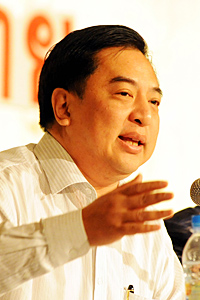
The bottom-line performance of any government is measured by its success in managing the economy and putting money into its citizens' wallets. In Thailand, as long as the current ruling regime can deliver on the economic front, it can remain authoritarian and generally safe from mass uprisings against it.
Every nation has a different history which leads to diverse governing regimes. China has a past of continuous authoritarian regimes to hold its vast population together. If wealth was too concentrated, the system broke down and failed, ending up with civil wars and competing fiefdoms.
For a semi-authoritarian country like Singapore, its former prime minister, Lee Kuan Yew, set up the nation under the principles of Confucianism and Christianity, together with a controlling model of democracy, bringing the tiny island state its very own economic miracle.

Suranand Vejjajiva was secretary-general to the prime minister during the Yingluck Shinawatra government and is now a political analyst.
In the US, liberal democracy and free market capitalism created the American dream of rags to riches. The wealth consumerism created after World War II changed the quality of life not just for Americans but the rest of the world.
Smaller nations have their own variations of governing systems; some are more stable while most fluctuate with leadership changes. Dictatorships and democracies fail alike when they do not deliver economic prosperity and proper distribution of wealth.
Thailand has a long tradition of technocratic authoritarian governments. Since the days of absolute monarchy through the 1932 Revolution until the present, whether democracy or dictatorship, the technocrats held sway. They supported and served the political masters of the regime. The technocratic regime has its benefits. It provides continuity and stability while promoting its personnel through a merit system. The agenda is set through a five-year development plan which subsequently defines annual state budgets.
The real power lies with the way state agencies define law into complicate sets rules and regulations which make or break a citizen's life, with all the loopholes, corruption and abuse they come with.
The faults of a bureaucratic structure are many. Officials set programmes and projects which may not meet people's needs. The tendency for officials to act as patrons is high. Favours are handed out with the expectation of financial kickbacks. Officials abuse their power with little or no checks and balances from the public.
In a technocratic authoritarian regime, the covering up of wrongdoings is subtle. Government officials scratch the backs of one another and whistleblowers are ignored.
When power is concentrated, top-down programmes are more geared toward benefiting the influential in both the public and private sectors. Large corporations become the recipients of projects by offering incentives and financial support. The rest of the population await handouts without real opportunity for growth and wealth accumulation.
This is why democracy matters. Democracy provides channels for the common people to voice their concerns. Elected to public office, the officials or representatives become the protectors of their constituents. Budget allocations are proposed by the people. Even though, in reality, projects and programmes are negotiated with the bureaucrats, they are more geared toward genuine public needs.
In modern Thai political history, a hybrid technocratic democracy became the model for governance. Elections provided a pressure release valve for concerned voters. Leverage and negotiations entailed between the technocrats and their supposed elected masters. Semi-democracy worked well for the business elites too. With the right combination and a conducive global situation, the hybrid model has, at times, led to economic growth, such as in the 1980s under then prime minister Gen Prem Tinsulanonda.
But as Thai democracy evolved with the 1997 Constitution, a strong democratic and populist government emerged under the leadership of former prime minister Thaksin Shinawatra. Elected officials dominated and directed the technocrats with their own political platform approved by the voters. This created a discord between the elites and technocrats on one side and the elected politicians on the other. Finally, the political system broke down and subsequent coups d'etat in 2006 and 2014 turned the clock back on liberal democracy.
The current design for a government took these lessons into consideration. The present regime, and the subsequent one after the election, is full of controls allowing the technocrats to dictate policies and the nation's economic and social development agenda through the so-called 20-year strategic plan.
The mechanism of control through laws which rely on courts and independent agencies further weakens political parties. It breaks up political parties into small factions, making them easier to manipulate -- classic divide and rule.
After the election, parliament will be dictated to by the elite technocrats and their business allies, supervised by an unelected Senate. It is no longer a hybrid but total dominance of the electoral body by technocratic authoritarianism. The sharing of power will only be an illusion.
The technocrat model may have had success in the past, but as the world changes, it is not an assured future. With technology and the spread of knowledge through the internet and social media, a do-gooder-know-all technocratic patronage may not be the answer. The concentration of power favours large business enterprises which crowds out smaller innovative entities.
The current design of the political structure does not serve the needs of the people and will not be sustainable. To pursue this course is an invitation to conflict unprecedented in Thai history.
